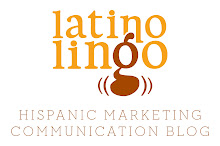
The blogs have been active since last week regarding this Absolut Vodka ad depicting an image where "in an absolut world," the Mexican border is shown extending north to about Oregon, east to Colorado and south to Texas.
While the ad has only run in Mexico, it has come to light here in the U.S. and has certainly further fueled the existing illegal immigration debate and racial overtones on both sides of the issue.
Absolut has since apologized for the ad making itself known in the U.S. (
I assume someone else purposely put the ad's title in English to make the point, since the rest of the copy, including the disclaimer, is in Spanish).
Since I write about Hispanic marketing issues, I don't want to write about this from a political or other perspective, though it seems natural to do so.
However, from a marketing perspective, the ad's audience is obviously Mexicans who harbor the "border crossed us, we didn't cross the border" sentiment. There are many in that category on both sides of the border. While I don't know how many in this category prefer vodka over tequila, the ad strikes to the core of this sentiment, and was probably pretty well received. Those Mexicans or other Hispanic ethnic groups that don't necessarily harbor those strong feelings would have probably still had a chuckle at Absolut's
cojones, and the ad would have also likely resonated with them.
The issue, of course, is that in a global world, it is difficult to keep things only to your specific, target audience.
Case in point is the comments made by Barack Obama's pastor Jeremiah Wright. His comments were both racist and anti-American, but they resonated with the very specific Black liberation sentiment that blames America for many of the social ills facing the Black community (certainly the enthusiastic congregation listening to the comments showed that this is true). Like this ad, the "controversy" only ensued when the comments became known to the general public and no longer just by the specific and intended audience.
Perhaps the controversy publicity was part of Absolut's plan or that they felt the benefits of getting new customers far outweighed the negatives of those now calling for a boycott. Perhaps it was something else. Regardless, it's a good lesson on the global impact of any message.


